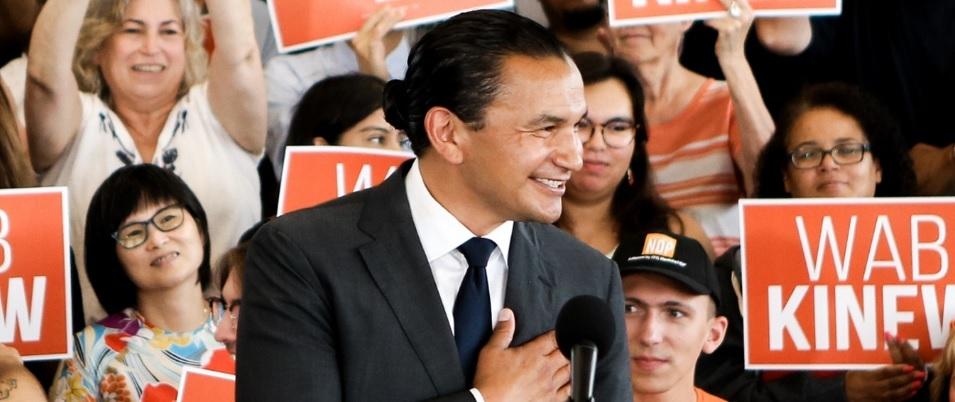Manitoba has a new government, and a new premier. On election night, Wab Kinew led the New Democratic Party to victory. The NDP dealt the incumbent Progressive Conservatives a crushing electoral blow, particularly in suburban Winnipeg.
According to the unofficial results, the NDP won 34 seats in the Legislature while the PCs will be reduced to 22 seats.
Closer to home, PC candidate Ron Schuler will return for another term as representative of Springfield-Ritchot, having secured 5,743 votes. Second place belongs to the NDP’s Tammy Ivanco with 3,810 votes. The Liberal candidates, Trevor Kirczenow, came in third place with 892 votes.
“I would like to thank the voters of Springfield, Ritchot, and Niverville for once again electing me as their MLA,” says Schuler. “I will continue to serve my constituents with the same enthusiasm that I did the past four years.”
In other nearby constituencies, the PCs won by predictable margins in their usual strongholds. Kelvin Goertzen won Steinbach with 73.8 percent of the vote, Lauren Stone won Midland with 69.4 percent, and Konrad Narth won La Veréndrye with 61.4 percent. The result was somewhat closer in Dawson Trail, where PC incumbent Bob Lagassé skated by his NDP challenger by 757 votes.
Advance voting broke records this year, leading many to anticipate high voter turnout on election day. These forecasts did not pan out, however. Overall, turnout was 54 percent, down one percentage point from the 2019 provincial election.
Leaders Step Down
As votes rolled in late in the evening and the NDP victory became clear, two of the major party leaders announced that they would be stepping down.
Liberal leader Dougald Lamont suffered a stinging loss in his St. Boniface riding, losing to Robert Loiselle of the NDP. In his remarks, Lamont lamented the wave of strategic voting that his party’s fortunes take a downturn.
Indeed, the Liberals will return only one MLA to the Legislature.
“Sometimes you get caught in a wave, and it doesn’t seem to matter what you do,” Lamont said.
Heather Stefanson, who served as the province’s first woman premier, having taken over from Brian Pallister after his resignation in 2021, held her head high even as she, too, decided to make way for a new leader.
“I have been a candidate for seven elections and I respect the will of the voters,” Stefanson said. “And today, the voters have spoken. The historic nature of Mr. Kinew’s victory must be acknowledged here this evening.”
Despite leaving her leadership role, Stefanson will continue on as MLA in her Tuxedo riding, where she squeaked by her NDP challenger in a surprisingly close race.
“Wab, I hope that your win here tonight inspires a future generation of Indigenous youth to get involved in our democratic process, not just here in Manitoba but right across the country,” Stefanson said.
In remarking on the accomplishments of her government, she pointed to the PCs’ success in implementing the largest personal income tax cuts in the province’s history, as well as bringing the budget to balance.
“Our Progressive Conservative government has set up our province for great success,” she said. “As we head to the other side of the House, I can tell Manitobans that the team of PC MLAs that you have elected tonight will keep fighting for you and we will hold the new government’s feet to the fire.”
Making History
Kinew made history with this election. He will be sworn in as the first First Nations premier of Manitoba. More than that, Manitoba will be the first province in Canada to ever elect a First Nations premier.
“Manitoba—my dear, sweet Manitoba—look at what we’ve done here tonight,” Kinew said to the raucous crowd of supporters who gathered at the Fort Garry Hotel. “We’ve elected a strong team of New Democrats to fix healthcare and make your life more affordable.”
He went on to reiterate many planks of the NDP platform, including pledges to reopen three new emergency rooms in Winnipeg and build a new cancer care facility to rival the best in the world.
The premier-designate then took time to personally address young Indigenous voters, many of whom have felt generationally disenfranchised.
“I want to speak to the young neechies out there,” he said, using a term that translates to friends. “I was given a second chance in life and I would like to think that I’ve made good on that opportunity. And you can do the same.”
His life was immensely improved, he said, when he stopped making excuses and started looking for a reason to live. For Kinew, his reasons were found in his family, his community, his province, and his country.
He encouraged Indigenous youth to pursue a better life. While a government can’t make that decision for them, Kinew pledged that his government would come alongside them by providing addictions recovery assistance, job training, and healthcare solutions close to home.
Kinew also addressed his rural audience, a part of Manitoba where PC support continues to be entrenched.
“For people in rural Manitoba that haven’t voted for us yet, I would ask you to keep an open mind,” said Kinew. “And if our team delivers, if after a few years we have improved your healthcare and we’ve made your life a bit more affordable, I would humbly ask that in four years’ time you send more people from your communities to sit with our team in the Manitoba Legislature.”
Kinew closed his remarks by introducing his mother Kathi, who stood with him at the podium. The crowd responded with a song to celebrate her birthday on the day of her son’s election win.


